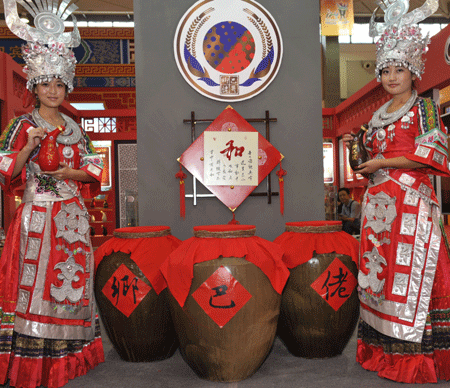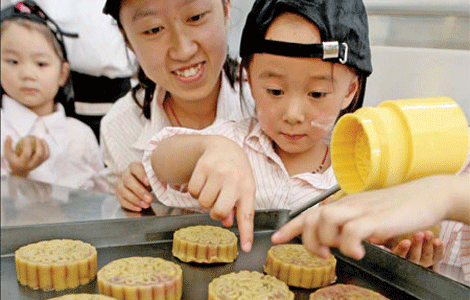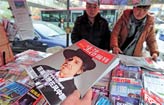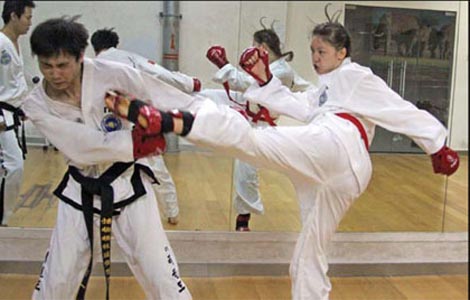Food
A liquor made for connoisseurs
Updated: 2011-09-13 16:08
By Qiu Bo (China Daily)
|
 |
|
Women from Miao ethnic group display Xiangbalao brand liquor at the China International Alcohol Fair in Guiyang, capital of Guizhou province, on Aug 18. Xiangbalao is a kind of sauce-fragrance liquor made in Moutai town in Guizhou. [Peng Nian / for China Daily] |
GUIZHOU
Almost 40 years ago, when former premier Zhou Enlai hosted a state banquet for former US president Richard Nixon in Beijing, the latter became inquisitive about a mellow soy sauce-like fragrance lingering in the hall.
The fragrance emanated from a special type of Chinese liquor called Moutai, which had been handpicked by Zhou. The former premier told Nixon that once he drank 25 cups of such strong liquor, which would add up to more than 1.25 kilogram, during the Long March. Nixon was impressed.
The special Chinese liquor has been used at official banquets hosted for foreign heads of state and distinguished guests visiting China, and is arguably one of the world's three best-known liquors - the other two are whisky and cognac.
Moutai originated during the Qing Dynasty (1644-1911) and is named after the town of the same name in Renhuai in Southwest China's Guizhou province. But Moutai is not the only liquor produced in the town. The town is home to several other "sauce-fragrance" liquors, similar to Moutai.
It is believed that the town's unique climate, water and vegetation contribute to the exceptional taste of the liquor. The wonderful fragrance emerges after fermented sorghum is distilled. Experts and academics are still undecided about what ingredients are responsible for it.
Sauce-fragrance liquor was originally produced from rough alcohol made by high quality wheat, locally produced sorghum and water from local sources. According to official records, the traditional method for making such liquors is very complicated, involving at least eight cycles of fermentation and nine rounds of high-temperature distillation under extremely strict conditions, before they are stored.
Unlike other types of Chinese liquor, Luzhou-flavor liquor for instance, the finished sauce-fragrance liquor is only allowed to mix with the same type of liquors but never water or any other form of alcohol. According to a Xinhua News Agency report, Guizhou had more than 200 distilleries making sauce-fragrance liquor by the end of August.
"We are proud not only of Moutai, but also of all sauce-fragrance liquor in Guizhou," says Huang Haitao, a 43-year-old resident of Guiyang, capital of Guizhou. Huang loves sauce-fragrance liquor and believes that the complicated distillation process ensures that unlike other liquors, it has a positive effect on the human body.
"I have never had a hangover after a night of heavy Moutai drinking, something which is common with other types of liquors," he says.
E-paper

Way over the moon
High inflation rockets mooncake prices out of orbit for mid-autumn festival
From death matches to child's play
Tomb raiders remain a menace
Kicking for joy
Specials

Singing success
Western musicians bring much-needed impetus to live performance industry

Salary bonanza for bosses
Top boss gets 8.78 million euros a year, far more than the State enterprise CEO with highest pay

Kicking for joy
Swedish college student represents China in Taekwondo championships
